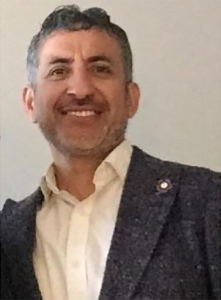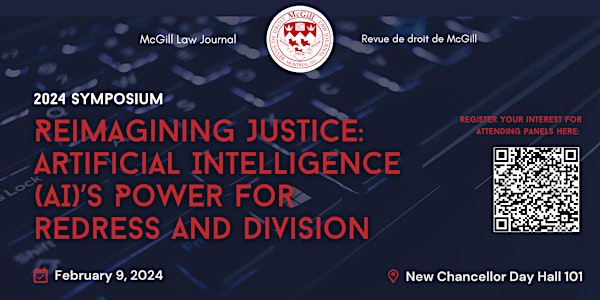Please join the McGill Law Journal on February 9th for this years symposium: Reimagining Justice: Artificial Intelligence (AI)’s Power for Redress and Division. Divided into three panels (see below for schedule and speakers), the event will center on how AI’s pervasive presence combats injustice and simultaneously deepens structures of inequality and unfairness in judicial systems. The event will be followed by a cocktail reception.
10:30-10:45: Introductory Remarks (Peer Zumbansen, McGill University)
 |
Sunny Handa is a Partner and National Practice Group Leader of Blake, Cassels & Graydon’s (Blakes) Technology Group (across all seven Blakes offices) and Communications Law Practice Group. He has also played a leading role in the development and running of the Blakes national Cybersecurity practice. Sunny is a senior corporate/commercial and regulatory lawyer who deals with information technology, communications (telecommunications and broadcasting), intellectual property and electronic commerce matters and a range of corporate/commercial matters relating to technology and communications businesses; he has a substantial practice in mergers and acquisitions of technology companies. He provides strategic, corporate/commercial and regulatory advice to leading companies in the IT, communications, life sciences and defence industries, both in Canada and globally. In his role as head of Blakes Technology and Communications practices, he oversees one of the country’s largest teams of dedicated technology lawyers. For over two decades Sunny has been consistently named by various ranking agencies as one of Canada’s leading lawyers in Intellectual Property Law, Computer and IT, Technology Transactions, Telecommunications and Media, Data Security, Data Privacy and Protection, Health Care Law, and Biotechnology Law. |
 |
Alberto R Salazar (Carleton): He is an Associate Professor in the Department of Law at Carleton University (Ottawa, Canada). He earned his PhD at Osgoode Hall Law School, York University (Toronto, Canada). Professor Salazar previously taught at Osgoode Hall Law School and the Business and Society Program at York University and served as MacArthur Fellow at the University of Oxford and a CAPORDE fellow at the University of Cambridge. He specializes in corporate law, corporate social responsibility, artificial intelligence and corporate governance, consumer law, competition law, international trade and investment law, and socio-economic analysis of business law. | Human Rights Assessment of Algorithmic Management and the Imperative of Directors’ Co-Determination Duties |

|
Pascale Chapdelaine (Windsor): Pascale Chapdelaine is Associate Professor at the Faculty of Law, University of Windsor. Prior to joining the Faculty of Law in 2014, she practised law for over fourteen years in corporate, commercial, and intellectual property law as Vice-President and legal counsel at one of Canada’s largest telecommunication companies, and prior to that, as Associate at a major Montréal-based law firm. Her broad research interests in law, technology, and society span various subjects at the intersection of copyright, contracts, property, privacy law, e-commerce, from the perspective of consumers and citizens. Some of her more recent research looks at algorithmic business practices and extraction of personal data, and how this leads to price and other forms of personalisation or discrimination in e-commerce, media content, and social media. |
The (Il)legality of Algorithmic Personalized Pricing: The Limits of Anti-Discrimination and AI Regulatory Frameworks |
 |
Suzie Dunn (Dalhousie University): Suzie Dunn an assistant professor at Dalhousie University’s Schulich School of Law. Her research centers on the intersections of equality, technology and the law, with a specific focus on artificial intelligence and technology-facilitated gender-based violence. She is currently conducting research with the DIY: Digitally Informed Youth project on young people’s experiences with technology-facilitated sexual violence. She is also a Senior Fellow with the Centre for International Governance Innovation’s Supporting a Safer Internet project and is a member of the Women’s Legal Education and Action Fund technology-facilitated violence committee. | Deepfakes: Gender, Privacy, and Synthetic Intimate Images |
 |
Vincent Gautrais est professeur titulaire à la Faculté de droit de l’Université de Montréal et chercheur au CRDP. Ses recherches portent en droit du numérique, domaine dans lequel il a obtenu 2 chaires successives (2003-2015 et 2015 – 2025). Il s’intéresse aux normativités numériques et à l’interaction entre droit et technologies, et ce, notamment dans des domaines de la vie privée, de la preuve, des contrats. Pour en savoir +, www.gautrais.com. |
 |
Céline Castets-Renard (Ottawa) &
|
Avorter à l’ère numérique: Reconvevoir une justice sociale pour l’exercise d’un droit entravé |
|
|
Caroline Lequesne (Univ. Côté D’Azur): | |
 |
Karen Eltis (Ottawa):Karen Eltis is a Full Professor of Law at the University of Ottawa and a Faculty member at its Centre for Law, Technology and Society. She is a past Affiliate with Princeton’s CITP (Center for Information Technology Policy). A past director of the uOttawa Human Rights Centre, Karen Eltis specializes in the impact of innovation on democratic governance, cybersecurity and artificial intelligence from a comparative perspective.
She served as Senior Advisor to the National Judicial Institute and has taught at Columbia Law School. Fluent in over five languages, Karen Eltis holds law degrees from McGill University, the Hebrew University of Jerusalem and Columbia Law School (Harlan Fiske Stone Scholar). Prior to joining the faculty at the University of Ottawa, Karen was a litigation associate in New York City. |
Déléguer l’autorité au système? L’exteriorization de la fonction judiciaire , la multiplication des causes et le dé-agencement des juges: Les retombées inattendues du déploiement de l’IA en justice |
 |
Charlaine Bouchard (Laval): Charlaine Bouchard est titulaire de la Chaire de recherche sur les contrats intelligents et la chaîne de blocs – Chambre des notaires du Québec. Elle est notaire et professeure titulaire en droit de l’entreprise à la Faculté de droit de l’Université Laval depuis 1998. Elle est détentrice d’un doctorat en droit de l’Université de Paris I Panthéon Sorbonne et d’un postdoctorat de la Faculté de droit de l’Université Laval. Elle est l’auteure de plus d’une centaine de publications scientifiques. Depuis quelques années, elle consacre ses recherches aux technologies émergentes et aux transformations du droit. Elle est pionnière sur la réflexion entourant la chaîne de blocs au Québec. |
L’organisation autonome décentralisée (DAO) : une nouvelle forme de gouvernance d’entreprise |

|
Jerome Solis is the Director of Applied Projects in the AI for Humanity department at Mila – Québec AI Institute. He leads a team of project managers dedicated to community-driven AI development for sustainable social impact. Together, they collaborate with various partners to navigate the discovery, conceptualization, and prototyping phases of deploying responsible AI systems.
With a strong background in product management for machine learning-based products, Jerome brings valuable expertise to his role. He has previously worked at Element AI, contributing to developing knowledge management products. In 2021, he joined Ada, focusing on building conversational AI agents for customer support. In 2023, Jerome joined Mila, leading their Applied Projects activities. Jerome holds a bachelor’s degree in Engineering Physics and a master’s degree in Electrical Engineering from Ecole Polytechnique de Montreal. |
 |
Gideon Christian (Calgary): Dr. Gideon Christian is an Assistant Professor of AI and Law at the Faculty of Law, University of Calgary. Prior to joining the University of Calgary, he was technology lawyer with the National Litigation Sector at the federal Department of Justice where he conducted electronic discovery in high profile litigation involving the Government of Canada. His research interests are in artificial intelligence and law, legal impacts of new and emerging technologies among other areas. Dr. Christian’s research seeks to identify elements of racial bias in laws, policies and in emerging technologies. His current research seeks to develop the concept of algorithmic racism which is defined as race-based bias arising from the use of AI-powered tools in the analysis of data in decision making resulting in unfair outcomes to individuals from a particular segment of the society characterised by race. Dr. Christian has appeared before the House of Commons Committee on Citizenship and Immigration (CIMM) as an expert in the use of AI in immigration decisions.
He is the Ontario Bar Association 2023/2024 Chief Justice of Ontario Fellow in Research. His fellowship aimed to develop ethical guidelines for the use of Generative AI in the legal profession. He was recently awarded grant from the Office of the Privacy Commissioner of Canada to research on racial bias arising from private sector development of AI facial recognition technology. |
Challenging the ‘New Jim Code’: Unmasking Racial Bias in AI Facial Recognition within the Canadian Immigration Context |
 |
Jennifer Raso (McGill): Jennifer Raso is an Assistant Professor at McGill University’s Faculty of Law, where she teaches Administrative Process, Science Technology and Law; and Law and Poverty. Her research investigates the relationship between discretion, data-driven technologies, and administrative law. She is particularly intrigued by how humans/non-humans collaborate and diverge as they produce institutional decisions, and the consequences for procedural fairness and substantive justice. Recent publications appear in the Canadian Journal of Law & Society, the Oxford Handbook of Administrative Justice, and Data & Society’s Keywords on the Datafied State Project, among other places.
|
Responsible AI: Binaries that Bind |
 |
Teresa Scassa (Ottawa): Dr. Teresa Scassa is the Canada Research Chair in Information Law and Policy at the University of Ottawa, Faculty of Law. Teresa has served on several national and provincial advisory panels on law and technology related issues. She has written widely in the area of privacy law, data governance, intellectual property law, law and technology, artificial intelligence, and smart cities. She is a co-editor of the books AI and the Law in Canada (2021), Law and the Sharing Economy (2017), and The Future of Open Data (2022). She is co-author of Digital Commerce in Canada (2020) and Canadian Intellectual Property Law (2013, 2018 and 2022). | Bias and Discrimination in AI Decision-Making: Lessons from R. v. RDS |
 |
Gregory Smolynec is Deputy Commissioner, Policy and Promotion in the Office of the Privacy Commissioner of Canada. The Promotion Program is future-looking and aims to inform Canadians of their rights and how to exercise them, and to bring organizations toward compliance with the law. As Deputy Commissioner Policy and Promotion, Gregory leads the OPC Policy and Promotion team in developing and promoting general, yet practical, information and guidance, and in developing advice on specific initiatives. Prior to his appointment, Gregory served as Director General Strategic Initiatives in the Strategic Joint Staff at National Defence Headquarter. As DGSI, he led the Strategic Outlook function for the Canadian Armed Forces. Strategic Outlook is an analytical, decision support process designed to identify and analyze the central military and technological challenges facing Canada and to inform strategic decision-making and advice to government. Gregory began his career with the Department of National Defence as a Strategic Analyst in Defence R&D Canada. He has worked in several organizations within the Department of National Defence as an analyst and has held a series of progressively responsible executive positions the Public Service. He has a Bachelor of Arts in History from McGill University, a Master of Arts in Russian and East European Studies from Carleton University and a Doctorate in History from Duke University.
Gregory Smolynec est sous-commissaire, Politiques et promotion, au Commissariat à la protection de la vie privée du Canada. Le programme de promotion est tourné vers l’avenir et vise à informer les Canadiens de leurs droits et de la façon de les exercer, et à amener les organisations à se conformer à la loi. En qualité de sous-commissaire, Politiques et promotion, Gregory dirige l’équipe du Secteur des politiques et de la promotion du Commissariat pour ce qui est d’élaborer et de promouvoir de l’information et des orientations générales, mais pratiques, et d’élaborer des conseils sur des initiatives précises. Avant sa nomination, Gregory était directeur général des initiatives stratégiques au sein de l’État-major interarmées stratégique localisé au Quartier général de la Défense nationale. À ce titre, il dirigeait la fonction de perspective stratégique pour les Forces armées canadiennes. La perspective stratégique est un processus d’analyse et de soutien à la prise de décisions conçu pour cerner et analyser les défis militaires et technologiques auxquels est confronté le Canada et pour éclairer la prise de décisions stratégiques et la préparation de conseils pour le gouvernement. Gregory a commencé sa carrière au sein du ministère de la Défense nationale en tant qu’analyste stratégique à R et D pour la défense Canada. Il a travaillé dans plusieurs organisations du ministère de la Défense nationale comme analyste et a occupé une série de postes de cadres qui comportaient des responsabilités de plus en plus grandes dans la fonction publique. Il détient un baccalauréat ès arts en histoire de l’Université McGill, une maîtrise ès arts en études sur la Russie et l’Europe de l’Est de l’Université Carleton et un doctorat en histoire de l’Université Duke. |
Please register your interest for attending panels here: https://www.eventbrite.ca/e/reimagining-justice-artificial-intelligences-power-for-redress-division-tickets-786077818917




